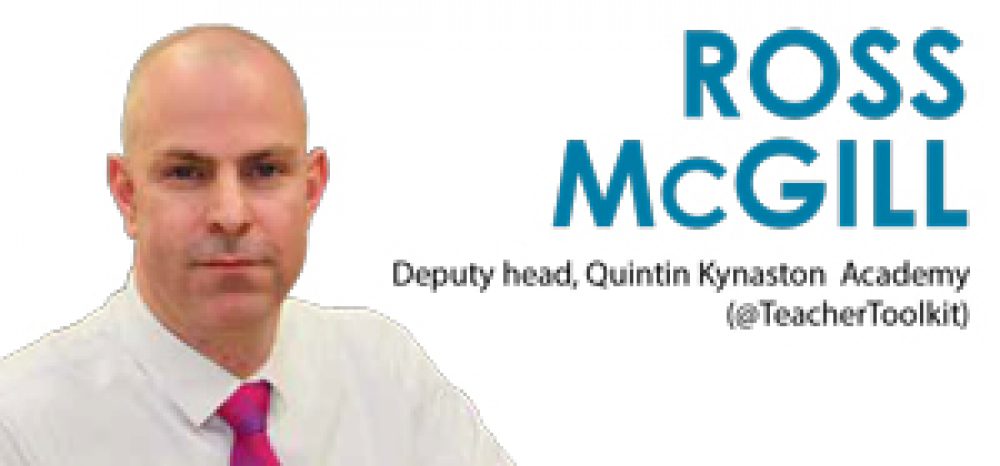Few teachers answered the series of questions in the DfE’s workload challenge on “unnecessary and unproductive tasks”. But apathy is no excuse for the government putting the challenge on the backburner — which will probably mean another wasted year until anything is done. Why are we still waiting?
The 43,855 responses to the Department for Education’s workload challenge — from 20,394 teachers — first launched a year ago have manifested into tumbleweed and are grinding to a stutter.
The government’s response and analysis to the survey was published in February 2015.
“The education secretary … announced the creation of three new working groups, including teachers, from September to help schools combat the profession’s long hours.”
Apparently, “members of the groups will be announced in [this month]”. Well, the last time I checked my diary, we are into September 2015 and we are still none the wiser!
I still have not received the call to offer my views and while our heads are down, back into the thick of it (Ofsted preparation; curriculum reform and the analysis of further — and baffling — grade boundary nonsense) the DfE has forgotten about all of us and have placed the workload challenge on the backburner.
We must challenge policy and mobilise ourselves
Once the working groups form, it will likely be towards the new year before we see any recommendations published, and even further into the academic year before anything can be implemented or embedded.
I therefore predict another ‘wasted year of rhetoric’.
However, I could be wrong. I’ve managed to track down two or three teachers who “have been asked” to be part of the elusive working groups. And yes, the groups do include teachers! Amazing …
So, hands up, have you been asked to join any of the three working parties (marking, lesson planning and data management)? Although some will, the majority of the 485,000 teachers in England and Wales now clutching their tea with bated breath will not!
The likelihood is there will be yet another published document offering lip-service, and little or no pragmatic solutions for schools and school leaders to support their teaching staff.
If you actually analyse the data from the challenge responses, only 1,645 teachers answered the series of questions regarding “unnecessary and unproductive tasks” within the survey! Are we too busy to respond to such an important issue? Did we miss the survey? Are we not that bothered?!
The unions have a right to be scathing of education secretary Nicky Morgan’s proposals. The increased pressure of schools to perform for Ofsted has resulted in thousands of headteachers working with FMD (Football Managers’ Dilemma), that is, the idea they could be sacked following post-August examination analysis.
The outcome is that any increased accountability by the DfE or blanket statements made by the chief inspector determine national leadership priorities and, in turn, workload for teachers.
More and more, teachers are being shunted away from direct work in the classroom with students into answering emails, paper-chasing, reporting, analysing data, creating interventions and “performing for inspection” rather than focusing on children’s needs. All of which has made the profession lose sight of what is important: teaching and learning.
Still, there is always hope. We must challenge policy and mobilise ourselves. It will be the only way we can determine our own fate. We are the experts. In March 2015, the DfE published a “protocol for changes to accountability, curriculum and qualifications” that said it was committed to “minimum lead-in times for significant changes to accountability, the curriculum and qualifications; and to do more to consider the impact on schools when introducing such changes”.
We must ensure that this guidance is followed and insist on more of the same from the likes of Ofsted and exams watchdog Ofqual.
We were promised six actions. A commitment to setting minimum lead-in times for significant curriculum, qualifications and accountability changes. Ofsted’s publication of “facts and myths” about what is expected in our classrooms. A survey every two years to assess workload. Support for school leaders to avoid FMD. A one-stop-shop where teachers can publish and access academic research. And a panel to be established to develop principles for good data and ICT management in schools.
On the first two; so far, so good. For the rest, we are still waiting.







I’d argue that they’d failed on the first, since teachers in primary have today been told of the *interim* assessment arrangements for the current academic year – far less notice than was promised.
If a bully slaps you in the face because he can, what should your response be? Will the bully stop because you just accepted the slap or will the bully give you another slap? If YOU do nothing, should you expect the bully to change his behaviour?
We all know that lack of action by the good encourages bad behaviour. What have the bullies got to lose? If a bully changes their behaviour this is an admission that they were wrong.
For how many more years are teachers going to accept slaps? Why are teachers encouraging bullies to slap them?
The general public must think that the bullies are doing the right thing because the teachers never object to being bullied.
The only way to stop persistent bullies is to stand up to them. The evidence so far is that teachers will not. Is this a profession?